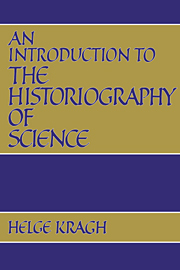Book contents
- Frontmatter
- Contents
- Preface
- 1 Aspects of the development of the history of science
- 2 History of science
- 3 Objectives and justification
- 4 Elements of theory of history
- 5 Objectivity in history
- 6 Explanations
- 7 Hypothetical history
- 8 Structure and organization
- 9 Anachronical and diachronical history of science
- 10 Ideology and myths in the history of science
- 11 Sources
- 12 Evaluation of source materials
- 13 Scientists' histories
- 14 Experimental history of science
- 15 The biographical approach
- 16 Prosopography
- 17 Scientometric historiography
- Notes
- Bibliography
- Index
3 - Objectives and justification
Published online by Cambridge University Press: 30 November 2009
- Frontmatter
- Contents
- Preface
- 1 Aspects of the development of the history of science
- 2 History of science
- 3 Objectives and justification
- 4 Elements of theory of history
- 5 Objectivity in history
- 6 Explanations
- 7 Hypothetical history
- 8 Structure and organization
- 9 Anachronical and diachronical history of science
- 10 Ideology and myths in the history of science
- 11 Sources
- 12 Evaluation of source materials
- 13 Scientists' histories
- 14 Experimental history of science
- 15 The biographical approach
- 16 Prosopography
- 17 Scientometric historiography
- Notes
- Bibliography
- Index
Summary
The development of history of science during the last three decades has been characterized by a proliferation of methods and perspectives rather than by the emergence of a consensus as to what, exactly, constitutes the discipline. The eclecticism and the fact that the discipline includes separate, partly conflicting, interests makes it problematic to talk about the aim of the history of science. Nonetheless, many have taken on the task of stating what the superior aim of the discipline should be. In what follows we discuss some frequently articulated viewpoints. In chapter 10 we shall discuss the ideological role that history of science may play in connection with scientific disciplines and institutions.
I. It is sometimes asserted that history of science, when properly conducted, can have a beneficial influence on the science of today. In its most primitive form it is suggested that the practising scientist may profitably make direct use of the history of his science; that by studying the works of earlier scientists he may receive inspiration for a solution he is looking for or even find out that the solution had already been discovered by a predecessor in the discipline. Opinions of this kind were common in early history of science (cf. chapter 1), although it was difficult to find concrete examples of scientists who had directly benefited from their knowledge of history. Truesdell is one of the few modern historians who has dared to make the same assertion.
Information
- Type
- Chapter
- Information
- An Introduction to the Historiography of Science , pp. 32 - 40Publisher: Cambridge University PressPrint publication year: 1987
